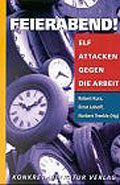| Book Review Archive 08.09.02 [49] |
|
||||
|
by Krisis group
This analysis is extended by Kurz in 'The Degradation of Culture'. Trenkle details the 'Terrorism of Labour', while Kurz applies this process to culture. If, post WW2, Keynesianism allowed subsidies to the arts, this to some degree liberated it from the terrors of capitalism.
This cushioning has gone now, such that artists and writers are filtered,
utterly subordinate to the markets. Artists are now prostitutes, and culture
becomes 'miserable'. Science, history and social studies are likewise cut
off at source, such that society itself is isolated from self-reflective
critique. This, I suppose is one particular aspect of the way dissident
voices are being excluded and silenced. Kurz advocates guilds and similar
groups to try to save cultural resources from the barbarism of the markets.
In 'Realists and Fundamentalists', the rise of religion as an irrational
force is understood as a result of mass misery. 'The End of History' under
Postmodernism brings eschatology as a theme; Oklahoma and the Aum cult are
the flip side of the basic Calvinism of the free market. This essay ends
with a plea for a reformulated socialism. In 'Hysterical Populism' Kurz
follows much the same theme, discussing the tendency for liberalism to blame
individuals rather than the system, and to scapegoat people and then groups
when things go wrong. Various candidates are put up. Gunter Ogger blamed
managers, a best selling theme. Everybody hates the boss. Others blamed
speculators like George Soros. From there we move up to asylum seekers and
paedophiles. Kurz draws an analogy between this process and the Fritz Lang
film 'M'. Meanwhile, the financial system crumbles.
The final essay deals with 11th September, and the 'War Against Terrorism'.
The global financial system is drawn as a womb, giving birth to mega-terror.
All the monsters - Saddam, the Ayatollah, the Taliban and Osama, were born
out of western policies, atrocities and actions. This kind of hatred is
currently being internalised, eg in US school shootings, and turned against
western society itself.
The essays are a response to present concerns and are not a reiteration
of the dead dogmas of the past. This said, I noted a tendency to sit within
the defined parameters of the system itself. In my opinion, there is a failure
to 'think outside the box' here. For example, we have had perhaps 80 - 84
financial crises since the abandonment of Bretton Woods in 1971. 'Crisis'
is characteristic, fundamental to global capitalism, but the system just
keeps on churning regardless.
Why? An examination of their fundamental assumption here might bring a different angle on their belief that it will eventually collapse. A second assumption here is about mass-misery. Within the system, alienation and mass-misery is doubtless true. I do not find any sense here that escape is possible. (A similar point also applies to their treatment of art.) Yet, I know from my own experience that people can escape from the system, and to some extent live outside it. Yet, these comments / responses aside, this book of essays is readable and topical. They are surprisingly free of dull Marxist jargon. The call to re-examine economics is timely, and justified. This booklet is a welcome addition to the literature.
|
|||
|
BLUE is looking for short fiction, extracts of novels, poetry, lyrics,
polemics, opinions, eyewitness accounts, news, features, information and arts
in any form relating to eco cultural- social- spiritual issues, events and
activites (creative and political). Send to Newsdesk. |


 Green Anarchist:
Green Anarchist: